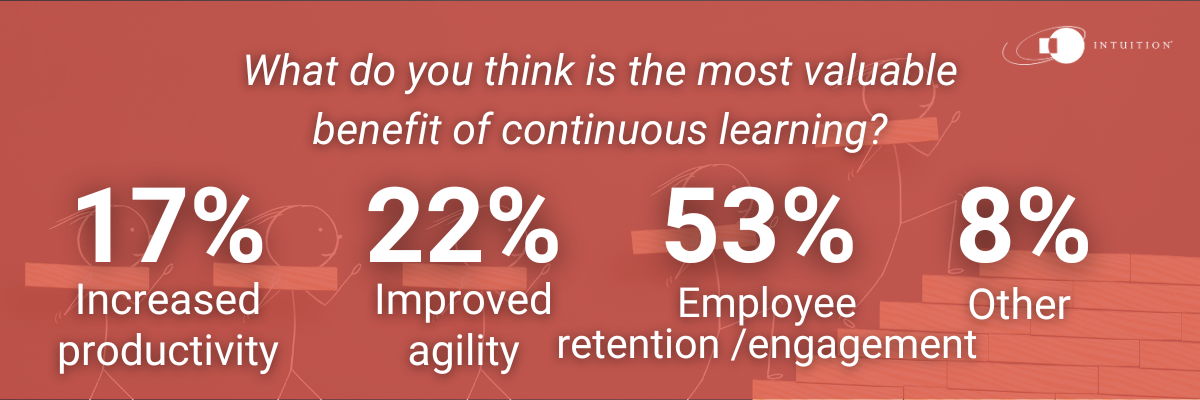The most valuable benefit of continuous learning
This article, ‘The most valuable benefit of continuous learning’, is taken from our report ‘Tomorrow’s Lessons Today: Unique insights into the World of Corporate Learning’. Throughout 2023, we asked our online audience a series of questions relating to corporate learning with some interesting results.
To access the full report, click here: Unique Insights into the World of Corporate Learning

Continuous learning offers several significant benefits to the workforce. Among them, increased productivity, improved agility, and better employee retention and engagement. In this poll, we pitted these three options against each other to see which came out top.
Continuous learning & employee retention and engagement
Employee retention and engagement are critical factors that directly impact an organization’s overall performance and success. When employees feel valued, supported, and given opportunities to grow, they are more likely to stay with the company, contribute their best efforts, and actively participate in achieving organizational goals. Continuous learning plays a vital role in fostering employee retention and engagement for several reasons.
1. Continuous learning demonstrates commitment to employee development
By investing in these programs, organizations demonstrate their commitment to employee development and growth. This commitment creates a sense of loyalty and engagement among employees, as they perceive the organization as a place where their skills and knowledge are valued and nurtured. Continuous learning opportunities provide employees with the chance to acquire new skills, expand their expertise, and advance their careers within the organization.
2. Continuous learning increases job satisfaction
These initiatives empower employees to develop a growth mindset and continuously improve their skills. As employees broaden their knowledge and acquire new competencies, they become more confident in their abilities to perform their jobs effectively. This increased confidence translates into higher productivity, better decision-making, and a greater willingness to take on new challenges, ultimately benefiting the organization as a whole.
3. Boosts employee confidence and competence
When employees have access to learning resources and opportunities, they are more likely to feel satisfied in their roles. Learning new skills and acquiring knowledge not only enhances their job performance but also adds variety, challenge, and fulfillment to their work. This increased job satisfaction leads to higher levels of engagement, reduced turnover rates, and a positive work culture.
4. Continuous learning drives innovation and adaptability
Organizations need to be agile and adaptable to remain competitive. Constant learning equips employees with the skills and knowledge necessary to embrace change, innovate, and adapt to new technologies, market trends, and industry disruptions. By fostering a learning culture, organizations can create a workforce that is constantly seeking opportunities for growth, innovation, and improvement.

Summary
- Employee retention/engagement is one of the most valuable benefits for organizations.
- By investing in continuous learning initiatives, organizations can create a positive work environment, enhance employee satisfaction, and drive innovation and adaptability.
- Ultimately, these efforts contribute to the long-term success and growth of the organization.


